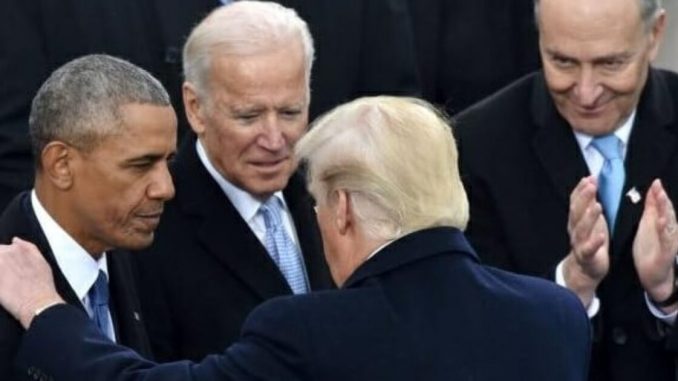
| Published August 6, 2025
A storm is brewing over claims that two of the largest financial institutions in the United States severed their ties with former President Donald J. Trump under political pressure. Allegations suggest that these banks acted not on financial grounds, but as part of a broader campaign to isolate political opposition following the unrest of January 6. Whether proven or not, the implications challenge the very foundation of financial neutrality in America.
Trump: “I Was Debanked”
In a recent interview, Trump claimed that he was instructed to close his accounts within 20 days by one of the banks he had worked with for years. Another reportedly refused to accept over $1 billion in deposits. He framed the actions as deliberate political targeting, warning that “financial censorship is the new frontier of suppression.”
Allegations of Political Influence
Anonymous insiders and commentary from those close to the matter suggest that government officials may have leaned on financial institutions to distance themselves from Trump and his associates in the wake of January 6. These actions, if verified, would indicate a coordinated effort to deny financial services based on political alignment.
Although no official documentation has surfaced to confirm direct involvement, the timing and sequence of regulatory changes and account decisions have raised red flags across the political spectrum.
Financial Institutions Respond
The banks involved have pushed back on claims of political motivation. They assert that all decisions regarding account closures are based on internal compliance reviews and regulatory standards—not ideology. Nonetheless, growing public scrutiny has forced financial firms to clarify how “reputational risk” is measured, as this standard has been criticized for being vague and potentially biased.
In response to mounting concerns, financial regulators have recently begun rolling back the use of reputational risk as a supervisory benchmark.
Executive Action Looms
Efforts are now underway to introduce an executive order mandating federal agencies to investigate politically motivated account closures. This directive would compel regulators to determine whether existing laws protecting individuals from discrimination in financial services have been violated. If so, institutions could face heavy penalties and restrictions.
Such a move would mark a turning point in financial regulation, imposing clearer boundaries on when and why accounts can be terminated—particularly for politically exposed persons.
Trump was debanked to his role in the January 6 riot at the Capitol buiilding.
Supporters of President Donald Trump clashed with police at the U.S. Capitol on Wednesday, January 6, 2021 in Washington, D.C.
Trump called out Bank of America CEO Brian Moynihan for not allowing him to open accounts after leaving office
Trump said that he was debanked during an interview with CNBC
Trump said that he is vowing to end debanking.
 Implications:
Implications:
Here are the key implications of the reported “debanking” of Donald Trump by JPMorgan and Bank of America under alleged Biden administration pressure:
🔍 1. Weaponization of Financial Institutions
If the claims are true, this case suggests the federal government (or its perceived influence) may be used to indirectly punish political opponents by pressuring banks—a form of financial censorship.
Implication: A dangerous precedent where access to financial services becomes politicized, undermining the principle of neutral banking.
🧑💼 2. Risk of Broader Debanking for Political Views
This incident raises fears that other individuals or groups—especially conservative or politically nonconformist voices—could also be targeted for financial exclusion, even without legal cause.
Implication: Accelerates calls for legislation ensuring equal banking access regardless of political affiliation (e.g., the Fair Access to Banking Act).
⚖️ 3. Legal & Regulatory Shake-Up
The backlash may result in new laws, regulations, or executive orders to investigate and penalize ideological discrimination by banks—potentially reining in practices based on “reputational risk.”
Implication: Banks could face increased oversight, legal consequences, and limitations on their discretion to close accounts or deny services.
🏦 4. Erosion of Trust in Big Banks
Whether true or not, the allegations contribute to public distrust in major financial institutions, especially among conservatives who may now see banks as arms of partisan enforcement.
Implication: This may fuel decentralized finance (DeFi) interest, adoption of crypto alternatives, or creation of ideologically aligned financial services.
🗳️ 5. 2026 & 2028 Election Fuel
The incident gives Trump and allies a powerful campaign narrative: that elites are “debanking dissent,” suppressing opposition not through courts but through banks.
Implication: Expect more populist rhetoric, policy proposals, and possible retaliation against financial institutions if Republicans regain executive power.
🌐 6. International Signal
Foreign investors and governments watching this may question the political neutrality of U.S. banks, potentially harming America’s reputation as a stable and apolitical financial hub.
Implication: Long-term damage to the credibility of U.S. financial institutions in international markets.
📊 7. Corporate Compliance Pressure
Banks will now face pressure from both sides—regulators and the public—to prove neutrality in their risk assessments and client decisions.
Implication: Could lead to more transparency in account closures and internal policies—but also hesitation in serving politically exposed persons (PEPs).
 Overall Takeaway:
Overall Takeaway:
The controversy surrounding Donald Trump’s alleged “debanking” by two of America’s largest financial institutions underlines a growing and deeply concerning trend: the potential politicization of the banking system. Whether these actions were the result of direct government pressure or independent risk assessments influenced by political climate, the implications are the same—a threat to financial neutrality, civil liberties, and equal access to essential services.
If individuals and organizations can be denied banking privileges based on political views or affiliations, the door opens to a broader erosion of rights and freedoms. This issue transcends party lines and should alarm anyone who values the principles of fairness, due process, and a free society.
As regulatory bodies, lawmakers, and the American public grapple with the fallout, one thing is clear: a transparent, accountable, and apolitical financial system is not optional—it is essential to the integrity of a constitutional republic.
SOURCES: THE GATEWAY PUNDIT – Biden Regime Pressured JP Morgan, Bank of America to ‘Debank’ President Trump After January 6
THE NEW YORK POST – JPMorgan and Bank of America ‘debanked’ Trump under pressure from Biden admin over January 6th: Sources










Be the first to comment